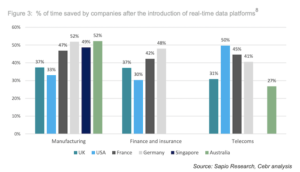
New KX Report Analyzes Business Impact of Real-time Analytics

Real-time analytics, also known as streaming analytics, is a subset of data analytics that helps businesses obtain real-time insights and predictions from large volumes of data to allow for optimal, immediate decision making. Real-time data platforms are often highly scalable and offer many capabilities rolled into one: real-time analytics, time-series databases, complex event processing, machine learning, and data visualization tools. These capabilities assist with the automation of business processes and workflows to increase productivity.
Streaming analytics firm KX and the Centre for Economics and Business Research (CEBR) have published an industry report on the business impacts of real-time analytics titled “The Speed to Business Value.”
The report’s authors surveyed over 1,200 companies in four sectors including manufacturing, automotive, finance and insurance, and telecommunications, and it found that 80% of companies surveyed saw increased revenues after introducing real-time analytics capabilities.
Companies were surveyed in regions including the U.S., U.K., France, Germany, Singapore, and Australia, and the report shows impacts both at the firm level and within the wider economy. According to KX, “The total potential revenue uplift is $2.6 trillion across the regions and sectors surveyed with a further $1.6 trillion of future additional revenue also possible.”
“We estimate a recognized increase in GVA (gross value added) of $1.9 billion across all countries and sectors from using a real-time data system to process and manage data. Potentially this could grow by $868 million further,” as was noted in the report’s executive summary.
“As the headline findings of this report show, by implementing real-time data analytics technologies, businesses globally can realize significant measurable business value,” said Kathy Schneider, CMO at KX. “From process improvements to cost reductions and tangible impact on business revenues, the benefits are wide-reaching. This study provides a call to action for businesses not yet leveraging real-time streaming data to modernize their approach and not get left behind.”
The report’s survey focused on seven main benefits of real-time analytics, or Value Outcomes as the authors call them, which are: processing and managing data, optimizing data architecture, detecting anomalous operational or financial activity, development and launching of new applications, products, or services, optimizing operational non-people costs, understanding real-time market and operational performance, and improved customer experience.
In the U.S., data processing and management outcomes led to increased GVA in manufacturing ($549 million), automotive ($179 million), finance and insurance ($1.6 billion), and telecoms ($145 million). The value of real-time analytics for optimizing data architecture in the U.S. was also significant, as seen in the sectors of manufacturing ($2.3 billion), automotive ($937 million), finance and insurance ($999 million), and telecom ($258 million).
Other notable value outcome findings include how 98% of respondents saw increased customer satisfaction, and 60% noted gains in efficiency and productivity. Regarding efficiency, companies surveyed reported increased efficiency in rollout processes for new products, and services, as found by financial firms in France (74%), the U.S. (67%), and Germany (61%). In manufacturing, each market showed increased productivity for rollout processes, with companies in the U.S. (73%) and Australia (70%) disclosing the highest gains.
Higher customer satisfaction was noted in the areas of faster service delivery, increased sales, better product quality, and reduced costs. The telecom industry showed the most impact with 39% of companies reporting significant growth of positive feedback and 52% reporting moderate growth in this area.
Additionally, the report estimates that $321 billion has been saved in non-personnel-related operating costs and another $58 billion could be added to that number if real-time data analytics were fully adopted within the industries surveyed.
“Our research sets out both the scale and breadth of the economic benefits supported by real-time data. Based on a survey of over 1,200 business decision-makers across six countries and four industries, we estimated significant firm-level and macroeconomic benefits associated with both the current and potential utilization of the technologies,” said CEBR Head of Economic Advisory, Owen Good. “Notably, we estimate that firm-level gains from using real-time data – driven by productivity gains from more efficient processing and managing of data – resulted in an uplift of $7.4 billion in gross value added across all six countries, with a further potential increase of $3.6 billion if the benefits of real-time data were fully exploited.”
Related Items:
KX Welcomes New Languages to Speedy Analytics Database
Streaming Analytics: The Silver Bullet for Predictive Business Decisions
Five Ways to Apply Streaming Analytics Now





























